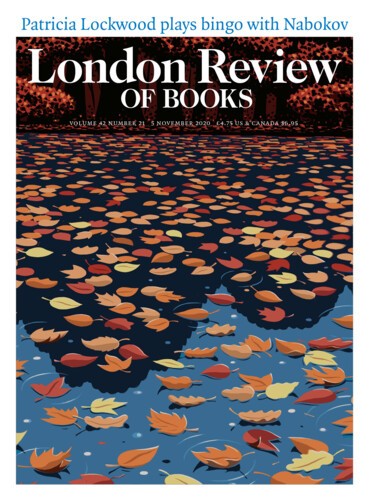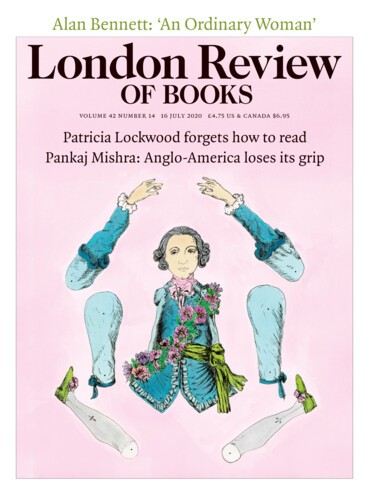‘If ever there was a book calculated to make a man in love with its author,’ William Godwin wrote in 1798 of Mary Wollstonecraft’s Letters Written During a Short Residence in Sweden, Norway and Denmark, ‘this appears to me to be the book.’ Mary’s aim was off: she was trying to get back an errant lover but ended up ensorcelling Godwin instead. Falling in love with someone through their writing is slow and delicious and sad, like sighing gently over the years at a screen actor, like, say, the guy whose cheekbones and tousle stare out at me from a postcard on my fridge door, and who now stares out from the back cover of A Bright Ray of Darkness, his new novel – Ethan Hawke.
Joanna Biggs
Joanna Biggs’s A Life of One’s Own is out in paperback.
At the start of the third lockdown, I wonder: what if lockdowns suit me? And I worry: shouldn’t it be easier now to understand what they do to my thoughts? Every day, I go out to walk under the bare trees and listen to one of the two albums Taylor Swift made last year: folklore, which came out in July, and evermore, which came out in December. (I’m not the only one: evermore is currently the number one album in the US, and number two in the UK.) The songs are a product of lockdown – Swift wrote them in the blank space that opened up when a tour had to be cancelled – but they are also of lockdown in the way they use a trace of the life before, a line like ‘meet me behind the mall,’ to conjure a world.
Diary: The only girl in the moshpit
Joanna Biggs, 5 November 2020
One of the puzzling things about feminism is that it can be confused with being self-centred. If it’s good for me, a woman might say of something she wants to do – whether it’s Botox injections, running a country, writing a book or being chronically late – then it’s good for feminism! Sometimes this sort of reasoning is a necessary release; sometimes...
What she wasn’t: ‘The Vanishing Half’
Joanna Biggs, 13 August 2020
‘Ihope the book gives you a sense of joy, something to immerse yourself in that is not the horrific news that we’ve been experiencing constantly and relentlessly since March,’ Brit Bennett said of her new novel. The Vanishing Half came out a week after George Floyd was choked to death on a Minneapolis sidewalk; the novel itself begins weeks after Martin Luther King was...
On Dorothea Lange
Joanna Biggs, 16 July 2020
‘Iwould like to be able to photograph constantly, every hour, every conscious hour,’ Dorothea Lange told an interviewer in 1963, two years before she died. There had always been constraints on how she could photograph: first, the limp that remained after she had polio when she was seven, growing up in Hoboken, New Jersey in a German immigrant family; then the need to make money at...
Podcasts & Videos
Ultimate Outsider
Toril Moi and Joanna Biggs
Toril Moi talks to Joanna Biggs about the French philosopher Simone Weil, whose short and uncompromising life became a workshop for her revolutionary ideas about labour, human suffering and the power...
No Wave Feminism
Jenny Turner and Joanna Biggs
Jenny Turner talks to Joanna Biggs about the history of the Women’s Liberation Movement, the loneliness of feminist work, and the seemingly unavoidable question: How do you think your life compares to...
Beauvoir and Me
Joanna Biggs and Thomas Jones
Joanna Biggs talks to Thomas Jones about the life of Simone de Beauvoir.
‘No, I’m not getting married!’
Susan Pedersen and Joanna Biggs
Susan Pedersen talks to Joanna Biggs about Shelagh Delaney and her landmark 1958 play, A Taste of Honey.
The LRB at 40: Women in Fiction
Nell Dunn, Tessa Hadley and Joanna Biggs
Nell Dunn and Tessa Hadley talk to Joanna Biggs about fictional representations of women’s everyday lives, as part of our 40th anniversary event series.
Modern-ish Poets: Sylvia Plath
Seamus Perry, Mark Ford and Joanna Biggs
Mark and Seamus are joined by Joanna Biggs, an editor at the LRB, to look at Sylvia Plath's life and poetry.
Read anywhere with the London Review of Books app, available now from the App Store for Apple devices, Google Play for Android devices and Amazon for your Kindle Fire.
Sign up to our newsletter
For highlights from the latest issue, our archive and the blog, as well as news, events and exclusive promotions.




